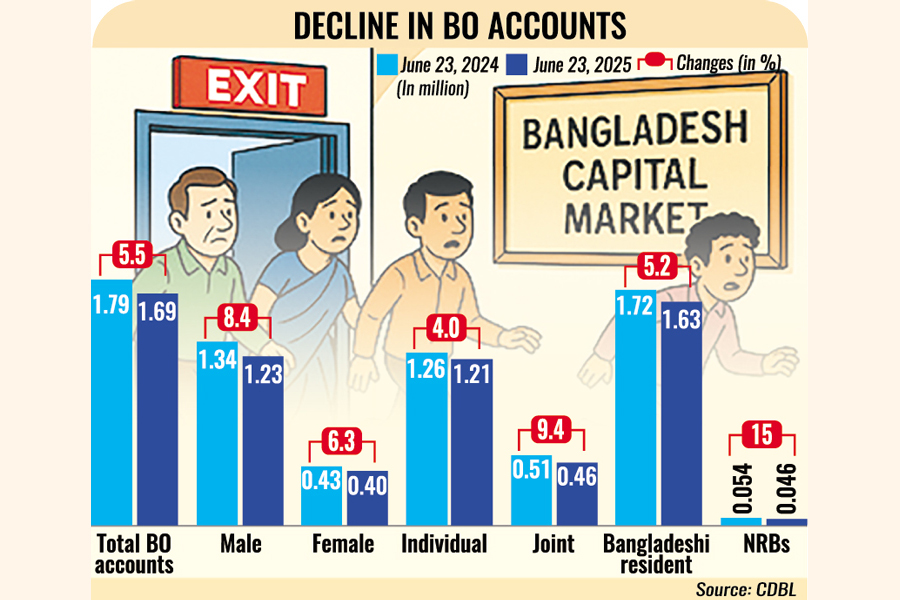
Published :
Updated :

The number of beneficiary owner's (BO) accounts with zero share balance surged by 6.8 per cent in the past one year as many investors sold off their entire holdings amid persistent economic challenges and political tensions.
The number of BO accounts with share balance was 1.31 million on June 23 last year, which fell to 1.22 million on Tuesday. That means 0.90 million accounts had been emptied during the period.
Therefore, nearly 28 per cent of the existing 1.69 million BO accounts have zero share balance, according to the data from the Central Depository Bangladesh Ltd (CDBL) that preserves information about individual and institutional investors.
The market in this period experienced significant volatility and value erosion. So, owners of the empty BO accounts dumped their entire holdings even if they endured huge losses.
In addition to the empty accounts, nearly 100,000 accounts were closed in the year to Tuesday. That indicates some investors exited the market while many may have reduced the number of portfolios they had amid lingering macroeconomic challenges.
Market analysts say there are multiple reasons behind the closure of BO accounts or the surge in empty accounts, including severe confidence crisis and no new initial public offering (IPO) in a long time.
Investors felt discouraged from sticking around as profits from both the secondary and primary markets declined significantly, said Akramul Alam, head of research at Royal Capital.
"No new investors are showing interest, while many existing investors are withdrawing their funds by selling shares even in losses," he said.
A section of investors opened BO accounts only to apply for primary shares. "But there has been no new IPO in the past 18 months, which is another major reason for the declining trend of BO accounts," added Mr Alam.
Not only is the number of investable securities very limited but also investments in good stocks cannot secure good returns.
Meanwhile, other financial instruments have been offering handsome yields.
"Higher returns from Treasury bonds inspire investors to move funds away to the money market from the stock market," said Md Sajedul Islam, managing director of Shyamol Equity Management.
The declining trend of BO accounts, however, started two years back, triggered by the mandatory minimum investment requirement for applying for IPO shares. The move was intended to boost trade in the secondary market.
BO account holders have to spend around Tk 1,500 as service charges, including maintenance fee of bank accounts, while the pro-rata allocation system discourages investors to continue paying for their accounts as in many cases they get only 20-30 shares from an IPO. The cumulative effect accelerated the exodus, said Mr Islam.
Meanwhile, the securities regulator recently removed the minimum equity investment requirement for investors to apply for IPO shares and drastically cut BO maintenance fee to Tk 150 from Tk 450 a year, considering the present market condition and demand from stakeholders and investors.
The secondary market has been depressed against the backdrop of global and domestic economic slowdown. Rising inflation and energy prices and depreciation of the taka against the dollar squeezed the growth of businesses, eating away returns from investments in stocks.
The economy has long been struggling to make a comeback from the fallout of the coronavirus pandemic and then the Russia-Ukraine war, while higher interest on government securities drained funds from the capital market.
Promise of economic reforms, made by the interim government, gave rise to optimism about a turnaround of the market for a brief period after the political changeover in August last year.
But the hope has petered out as macroeconomic challenges deepened alongside political tension in the country.
As a result, the index of the Dhaka Stock Exchange (DSE) plunged 22 per cent from its peak in August last year while it lost Tk 592 billion in assets' value in the period through Tuesday.
The number of accounts of non-resident Bangladeshis dropped to 46,410 on Tuesday from 54,502 a year ago, the CDBL data shows.
To trade in the secondary market and apply for primary shares, an investor has to open a BO account with the CDBL through a depository participant, usually a stockbroker or a merchant bank.
There were times when investors showed confidence by pouring funds into the primary market due to guaranteed profits. And that helped the number of BO accounts rise to an all-time high of around 3.20 million in June 2015.
babulfexpress@gmail.com


 For all latest news, follow The Financial Express Google News channel.
For all latest news, follow The Financial Express Google News channel.